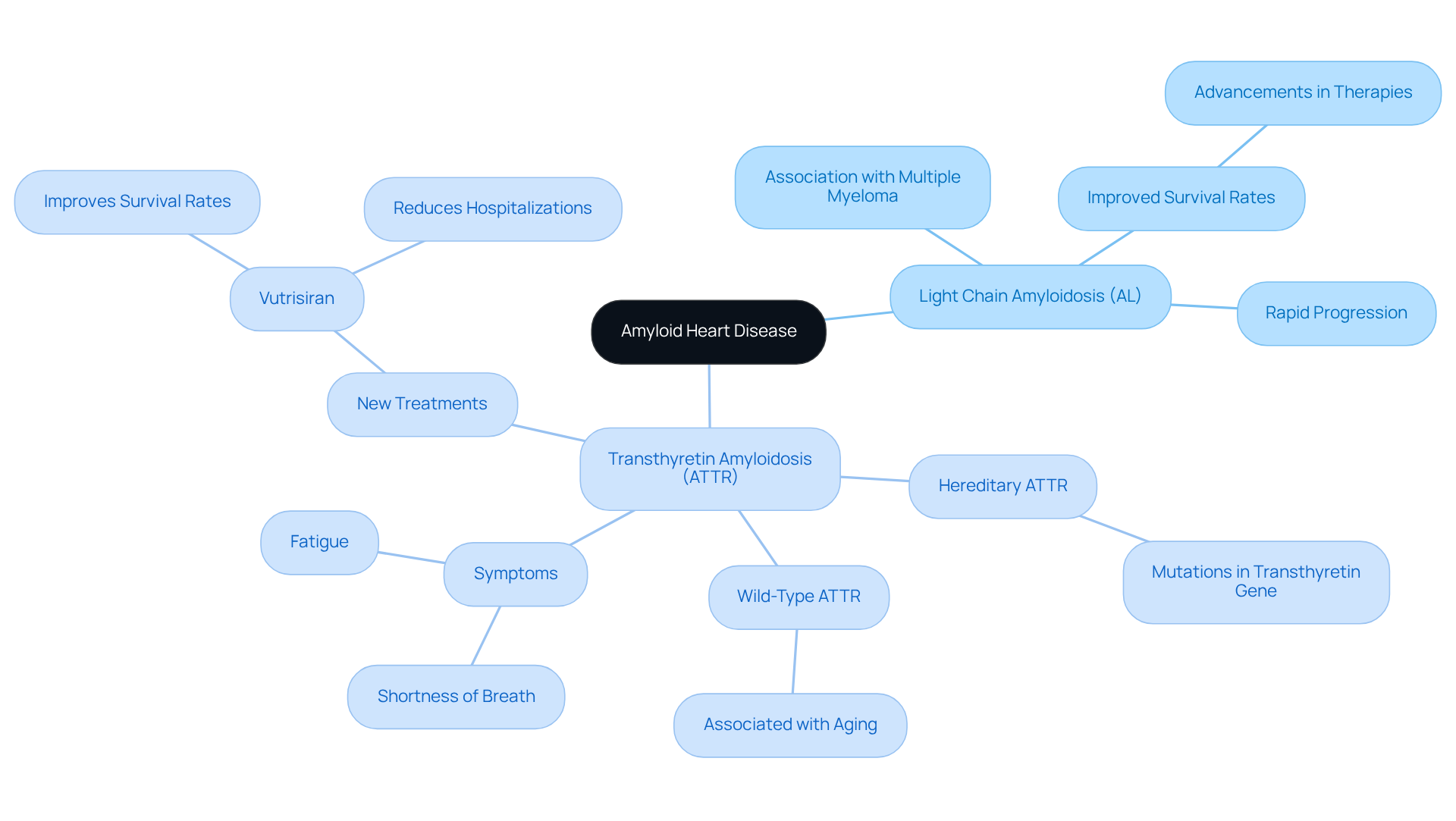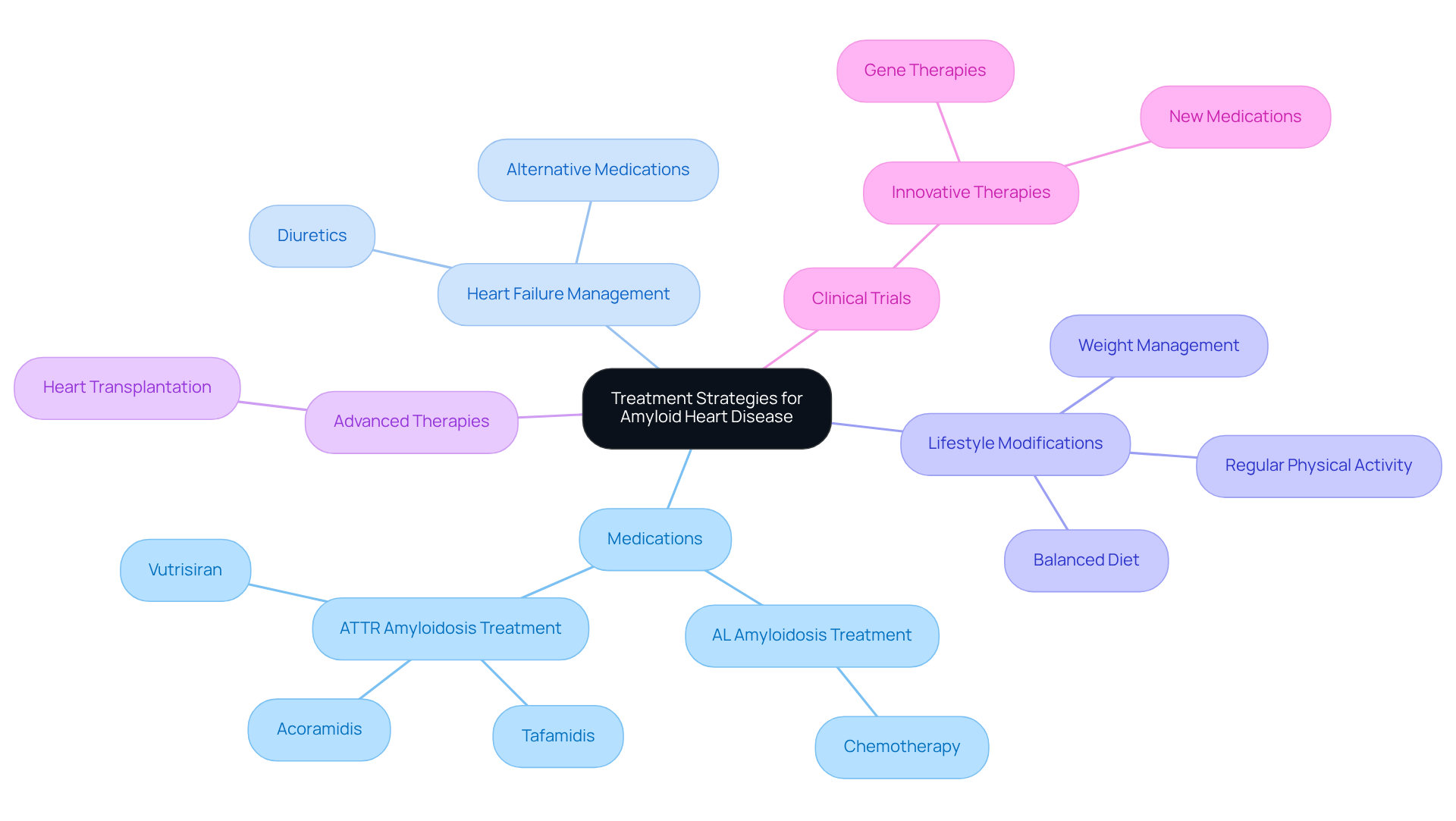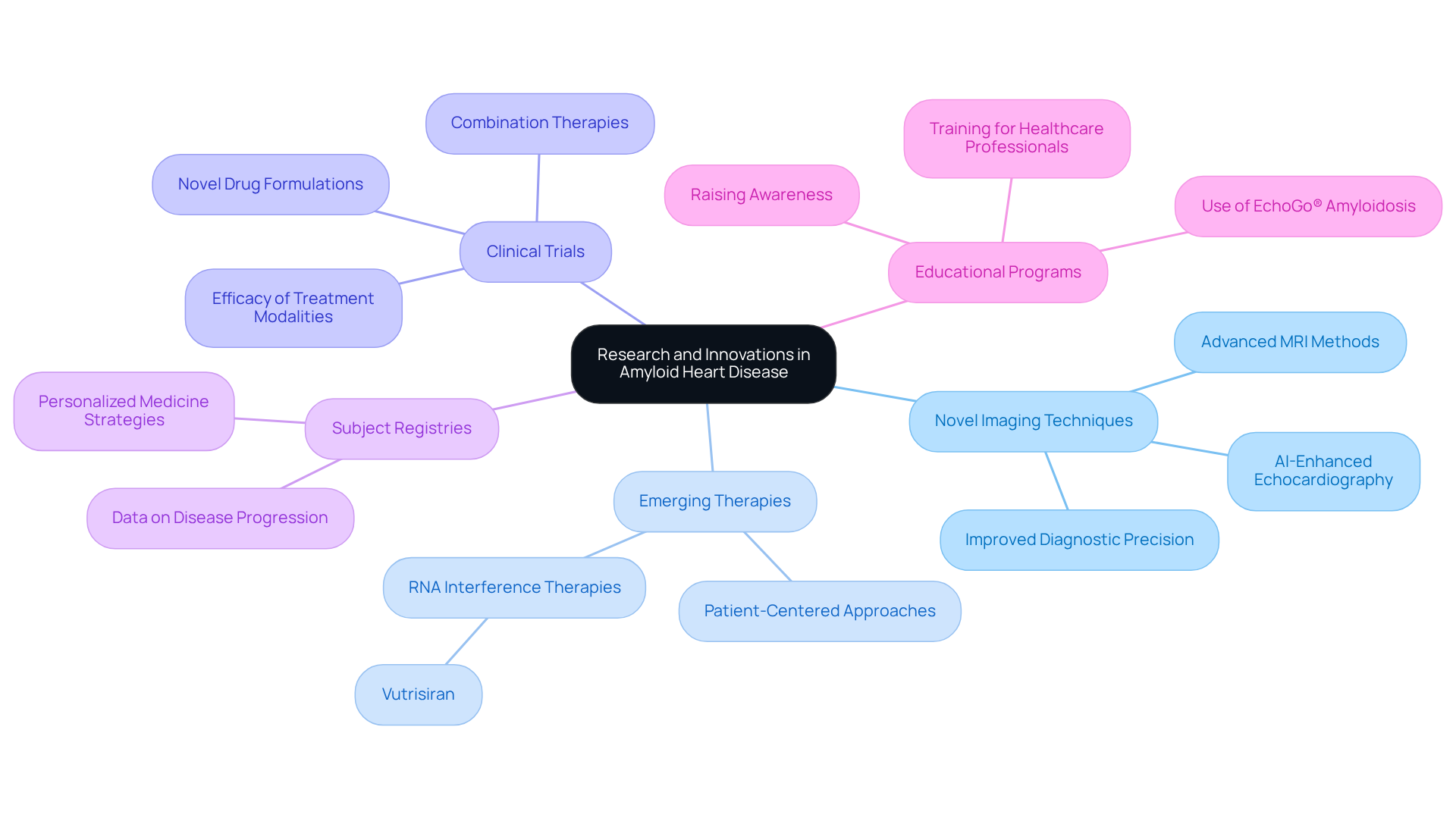


Understanding amyloid heart disease can feel overwhelming, but it's important to know that you are not alone. This condition primarily includes two types: Light Chain Amyloidosis (AL) and Transthyretin Amyloidosis (ATTR). Recognizing these types is the first step towards understanding your health.
In addition to identifying the types, advancements in diagnosis and treatment have made a significant difference in patient care. Early diagnosis through advanced imaging techniques is crucial. These developments have led to effective therapies that improve outcomes for many patients, offering hope and reassurance for those affected by this condition.
If you or a loved one are facing this diagnosis, remember that support is available. It's essential to seek help and explore the options that can lead to better health. You deserve care that addresses both your medical needs and emotional well-being. Together, we can navigate this journey with compassion and understanding.
Cardiac amyloidosis is a condition characterized by the accumulation of abnormal proteins in the heart, and it can bring about significant challenges for those diagnosed. As awareness of this condition increases, so too does our understanding of its two main forms—Light Chain Amyloidosis (AL) and Transthyretin Amyloidosis (ATTR). Each of these forms presents unique hurdles, but also opportunities for patients seeking care and support.
With advancements in diagnostic techniques and treatment options, the landscape of amyloid heart disease is evolving rapidly. This evolution raises important questions about how best to manage this complex condition. What innovative strategies are emerging to enhance patient outcomes and navigate the intricacies of amyloid heart disease?
It’s natural to feel overwhelmed by these challenges, but rest assured that you are not alone. Together, we can explore the latest developments in care and treatment, ensuring that your journey is met with understanding and compassion.
Cardiac amyloidosis, a condition related to protein buildup, can understandably raise concerns, especially when it involves the heart. This condition arises from the accumulation of abnormal proteins, known as fibrils, in the cardiac tissue, leading to both structural and functional impairments. It's important to be aware of the two primary types of amyloid heart disease:
Light Chain Amyloidosis (AL): This form occurs when light chains produced by abnormal plasma cells deposit in the heart. Often linked to conditions like multiple myeloma, AL amyloidosis can lead to significant cardiac dysfunction. It's marked by a rapid progression, which makes early diagnosis and treatment crucial. Fortunately, recent studies show that survival rates for AL amyloidosis patients have improved significantly due to advancements in therapies. Effective treatments are now available at all stages of the disease, offering hope and support to those affected.
Transthyretin Amyloidosis (ATTR): This type can be hereditary or acquired. In hereditary ATTR, mutations in the transthyretin gene lead to unstable proteins that misfold and accumulate in the heart muscle. On the other hand, wild-type ATTR, commonly seen in older adults, occurs without genetic mutations and is associated with aging. Both forms can cause thickening of the cardiac walls, which may present as symptoms like shortness of breath and fatigue, a condition associated with amyloid heart disease. Importantly, recent clinical trials have shown that new therapies for ATTR, such as vutrisiran, greatly enhance survival rates and improve quality of life for individuals, reducing the need for hospitalizations due to cardiac issues.
Understanding amyloid heart disease and other protein-related cardiac conditions is vital for effective treatment, particularly for older individuals who may be more susceptible to these ailments. As research progresses, the outlook for those with amyloid-related cardiac issues is becoming increasingly hopeful. Remember, it’s always okay to seek help and support when navigating these health challenges. You are not alone, and there are resources available to assist you on your journey.

Diagnosing amyloid heart disease requires a thoughtful and compassionate approach that combines clinical evaluation, advanced imaging techniques, and laboratory tests:
Clinical Evaluation: Physicians begin by listening to your concerns and evaluating symptoms such as fatigue, shortness of breath, and swelling, which may indicate cardiac issues. Recognizing these symptoms is crucial, as they often lead to further investigation and support.
Echocardiography: This imaging technique is usually the first step in diagnosis. It can reveal important findings like thickened cardiac walls and diastolic dysfunction. Recent advancements in AI-enhanced echocardiography have greatly improved diagnostic accuracy, boasting a sensitivity of 85% and specificity of 93% in identifying amyloid heart disease. The AI model shows an area under the receiver operating characteristic curve (AUROC) of 0.93, highlighting its effectiveness in screening.
Cardiac MRI: This imaging method provides detailed images of the heart and is particularly adept at detecting protein deposits through late gadolinium enhancement. This can offer insights that echocardiography might miss, ensuring a comprehensive understanding of your condition.
Nuclear Scintigraphy: This specialized scan helps differentiate between AL and ATTR amyloidosis by assessing the uptake of specific tracers. This distinction is vital for accurate classification and tailored treatment.
Biopsy: Often, a definitive diagnosis requires a biopsy of cardiac tissue. This tissue can be stained to confirm the presence of protein aggregates, providing conclusive evidence of the condition.
Blood and Urine Tests: These tests play a crucial role in identifying abnormal proteins and light chains, especially in AL amyloidosis. They are essential in supporting the overall diagnostic process and ensuring that you receive the appropriate care.
By integrating these diagnostic techniques, particularly the advancements in echocardiography, we emphasize the importance of early identification and intervention in effectively managing amyloid heart disease. Remember, seeking help and understanding your health is a vital step towards a brighter future.

The treatment for amyloid heart disease emphasizes alleviating symptoms and slowing disease progression through a compassionate, multifaceted approach.
Medications: For those facing AL amyloidosis, chemotherapy can be a vital option, helping to reduce the production of light chains that lead to harmful protein deposits. In the case of ATTR amyloidosis, the FDA has approved medications like tafamidis and acoramidis. These treatments stabilize the transthyretin protein, preventing further amyloid deposits in the heart. Many patients have experienced significant improvements in their condition and overall well-being through these therapies.
Heart Failure Management: Managing heart failure is essential for comfort. Diuretics can help control fluid retention, while beta-blockers and ACE inhibitors are often not well tolerated in patients with amyloid heart disease. Instead, alternative medications can be explored to support heart function and ease symptoms, ensuring that patients feel their best.
Lifestyle Modifications: Embracing heart-healthy habits is crucial for overall health. Patients are encouraged to maintain a balanced diet, engage in regular physical activity, and manage their weight. These small steps can have a profound impact on cardiovascular health and overall quality of life.
Advanced Therapies: For those with advanced heart failure due to amyloidosis, heart transplantation may offer a renewed chance at life. This option can significantly enhance quality of life and survival rates for carefully selected patients, providing hope in challenging times.
Clinical Trials: The journey towards better treatments continues with ongoing research. Innovative therapies, including gene therapies and new medications, are being explored to target protein deposits more effectively. The expansion of clinical trials is vital for deepening our understanding and improving care for this complex cardiac condition. If you or a loved one is navigating this journey, consider reaching out for support and information on available options.

Recent advancements in research and technology are significantly transforming the landscape of amyloid heart disease, offering hope and new possibilities for those affected:
Novel Imaging Techniques: Innovations such as AI-enhanced echocardiography and advanced MRI methods are improving diagnostic precision, allowing for earlier identification of protein deposits. These advancements not only increase identification rates but also enable timely interventions, which are crucial for effective management. At Amavita Heart and Vascular Health, our specialists are dedicated to leveraging these advanced imaging techniques to ensure comprehensive evaluations and same-day convenience for high-risk patients.
Emerging Therapies: New treatments, including RNA interference therapies like vutrisiran, are being developed to directly target the underlying mechanisms of protein production. Clinical trials are showing encouraging outcomes, suggesting that these therapies could significantly alter the progression of the condition. Amavita is committed to advancing cardiovascular care through innovative treatments that prioritize patient-centered approaches, ensuring that you receive the best possible care.
Clinical Trials: Ongoing studies are rigorously evaluating the efficacy of various treatment modalities, including combination therapies and novel drug formulations. These trials are crucial for improving outcomes for individuals impacted by amyloid-related conditions and broadening the therapeutic alternatives available to them. The validation of AI tools like EchoGo® through over 25 peer-reviewed studies underscores their potential in enhancing care management, reflecting Amavita's commitment to clinical research and patient support.
Subject registries that focus on gathering extensive data on individuals with amyloid heart disease are providing valuable insights into disease progression and treatment responses. This data is essential for paving the way for personalized medicine strategies, ensuring that treatments are customized to individual needs. At Amavita, we concentrate on developing individualized treatment plans grounded in comprehensive assessments and your medical history, fostering a supportive environment for your health journey.
Educational programs aimed at raising awareness and knowledge about amyloid heart disease among healthcare professionals and individuals are vital for advancing early diagnosis and access to treatment. Dr. Ashley Akerman highlighted that using EchoGo® Amyloidosis could assist in identifying at-risk individuals earlier and minimize unnecessary testing. This enables both individuals and clinicians to recognize symptoms sooner, leading to improved management and outcomes. Amavita is dedicated to educating patients about their heart health, particularly for those at high risk, ensuring you feel informed and empowered in your care.

Understanding amyloid heart disease is crucial for both patients and healthcare providers, as it highlights the complexities of a condition that can significantly impact heart health. This article has explored the nuances of cardiac amyloidosis, detailing its types—Light Chain Amyloidosis (AL) and Transthyretin Amyloidosis (ATTR)—while emphasizing the importance of early diagnosis and effective treatment strategies. As research progresses, the hope for improved outcomes and quality of life for those affected continues to grow.
Key insights discussed include the diagnostic methods that integrate clinical evaluations, advanced imaging techniques, and laboratory tests to ensure accurate identification of amyloid heart disease. The treatment landscape has also been outlined, showcasing the role of medications, lifestyle modifications, and advanced therapies, including heart transplantation and ongoing clinical trials that aim to refine and enhance patient care. These advancements not only provide immediate relief but also pave the way for innovative solutions in managing this complex condition.
The significance of understanding amyloid heart disease cannot be overstated. As awareness grows and research continues to evolve, it is essential for individuals to seek information and support. Engaging with healthcare professionals about symptoms, treatment options, and the latest research can empower patients to take control of their health journey. Embracing these resources fosters a community of support, ultimately leading to better management and improved outcomes for those navigating the challenges of amyloid heart disease.
In addition to this, consider reaching out to support groups or online communities where shared experiences can provide comfort and understanding. Remember, you are not alone in this journey—there are people and resources ready to help you every step of the way.
What is amyloid heart disease?
Amyloid heart disease, also known as cardiac amyloidosis, is a condition characterized by the accumulation of abnormal proteins, called fibrils, in the cardiac tissue, leading to structural and functional impairments of the heart.
What are the two primary types of amyloid heart disease?
The two primary types of amyloid heart disease are Light Chain Amyloidosis (AL) and Transthyretin Amyloidosis (ATTR).
What is Light Chain Amyloidosis (AL)?
Light Chain Amyloidosis (AL) occurs when light chains produced by abnormal plasma cells deposit in the heart. It is often linked to conditions like multiple myeloma and is marked by rapid progression, making early diagnosis and treatment crucial.
How have survival rates for AL amyloidosis patients changed?
Recent studies indicate that survival rates for AL amyloidosis patients have improved significantly due to advancements in therapies, with effective treatments now available at all stages of the disease.
What is Transthyretin Amyloidosis (ATTR)?
Transthyretin Amyloidosis (ATTR) can be hereditary or acquired. In hereditary ATTR, mutations in the transthyretin gene lead to unstable proteins that accumulate in the heart muscle. Wild-type ATTR, commonly seen in older adults, occurs without genetic mutations and is associated with aging.
What symptoms are associated with amyloid heart disease?
Symptoms of amyloid heart disease may include shortness of breath and fatigue, resulting from the thickening of the cardiac walls due to protein accumulation.
What advancements have been made in the treatment of ATTR?
Recent clinical trials have shown that new therapies, such as vutrisiran, greatly enhance survival rates and improve the quality of life for individuals with ATTR, reducing the need for hospitalizations due to cardiac issues.
Why is understanding amyloid heart disease important?
Understanding amyloid heart disease is vital for effective treatment, especially for older individuals who may be more susceptible to these conditions. As research progresses, the outlook for those with amyloid-related cardiac issues is becoming increasingly hopeful.